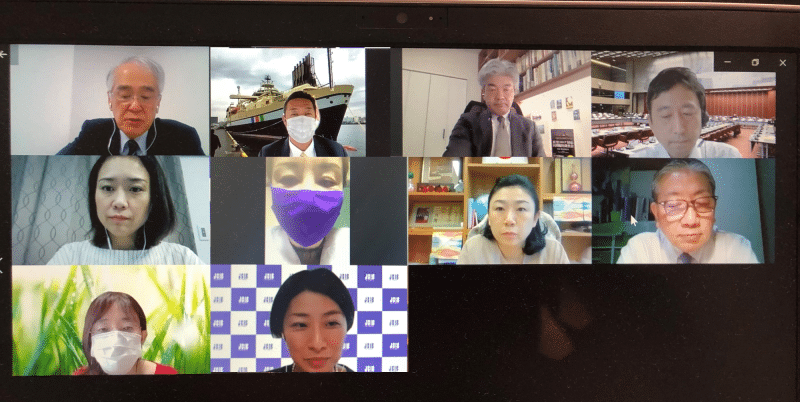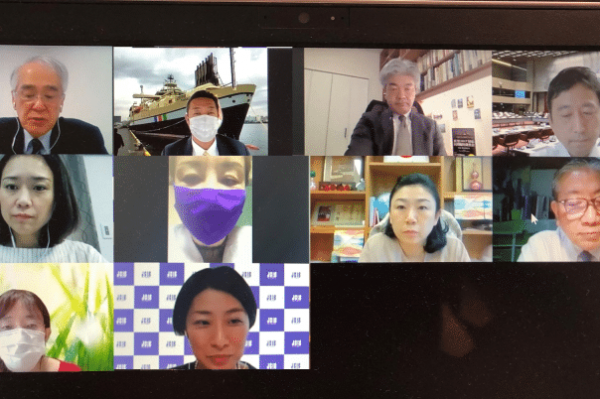On April 5, JCIE hosted its 6th Global Health Diet Roundtable, which was held online and attended by seven Diet members across multiple parties. Professor Kazuto Suzuki of the University of Tokyo’s Graduate School of Public Policy, and Masayuki Imagawa, president of the Japan Vaccine Industry Association, were invited as guest speakers to discuss the current status of COVID-19 vaccine development around the world, provide background information on the vaccine development delays in Japan, and highlight issues in the global COVID-19 response that Japan should address.
JCIE launched the Global Health Diet Roundtable series in 2018 as part of its Global Health and Human Security program. The aim of this program is to assist a bipartisan group of young and emerging Diet members in deepening their understanding of global health issues.

MAIN POINTS FROM SPEAKERS
From Kazuto Suzuki:
- The delay in vaccine development in Japan is partially due to the low birthrate and aging population, as well as strong skepticism toward vaccines. In addition, both the public and private sectors are cautious about vaccine development due to past vaccine and drug-related incidents. As a result, the development and marketing of therapeutic drugs has been more profitable for pharmaceutical companies than preventative vaccines. Additionally, Japanese pharmaceutical companies have been protected by the so-called “convoy system,” and many of them are small in global terms, which has made it difficult for them to diversify technologically and increase the scale of their research and development.
- In many developed countries, infectious diseases have been regarded as a “developing country problem.” What made COVID-19 so significant, then, was the fact that it hit developed countries directly, the failure of social intervention, and the resulting cessation of socioeconomic activities for nearly a year. In such a situation, “vaccine nationalism,” an attempt to enclose vaccines, gained momentum.
- The number of vaccinations per capita in China and Russia is not necessarily high, and it can be observed that vaccines in these countries are exported or provided free of charge to other countries rather than domestically.
- According to “The Logic of China’s Vaccine Diplomacy,” published in The Diplomat by Ivana Karásková and Veronika Blablová on March 24, 2021, China provides vaccines free of charge to at least 35 countries and exports to 30 countries. It is anticipated that Chinese vaccines will reach more countries in the near future and that China will become increasingly influential in foreign affairs.
- Infectious diseases, like natural disasters, are bound to strike at some point without warning. Therefore, Japan’s disaster prevention and crisis management should include the capacity to develop and manufacture vaccines.
- When considering vaccines as a diplomatic strategy, Japan should support fair distribution of vaccines through COVAX, an international cooperative system, in order to prevent certain countries from exercising monopolistic influence.
From Masayuki Imagawa:
- In Japan, Shionogi, Daiichi Sankyo, AnGes, KM Biologics, and other companies are developing vaccines. However, as these companies began work without a significant foundation, they are behind the rest of the world. This demonstrates that crisis response needs to begin prior to the disaster in question.
- From the industry perspective, vaccines are less attractive for investment as opposed to therapeutic drugs, such as anticancer agents, because of their narrow sales margin. Unless this changes, industry will not be able to respond to the next pandemic, which is the challenge.
- Vaccine development and production should be positioned as national crisis management, and instead of leaving it to individual companies, the government should strengthen its command and promote vaccine research, development, and production.
- Proposed measures to address this situation in Japan include the following:
- Since infection control is the cornerstone of crisis management in a pandemic, a command post that is aware of emergencies should be established at the national level from normal times, and a system should be built to enable stakeholders in industry, government, and academia to move in the right direction.
- A Japanese version of the U.S.’s Biomedical Advanced Research and Development Authority (BARDA) should be established, which would be very effective in promoting vaccine development under crisis management.
- Japan should introduce a pull (national stockpile or purchase) and push (R&D support incentives) process for vaccine projects to make them more attractive to industry.
- The leading companies in the development of COVID-19 vaccines are venture companies. Venture companies should be fostered to overcome the valley of death between academia and business in innovation.
To read the full report on this meeting in Japanese, please visit the JCIE/Japan website.
PARTICIPANTS
Speakers
TAKESHI KASAI, Regional Director, World Health Organization (WHO) Regional Office for the Western Pacific
KAZUTO SUZUKI, Professor, School of Public Policy, The University of Tokyo
MASAYUKI IMAGAWA, President, Japan Vaccine Industry Association
Diet Members
TAKAO ANDO, Member of the House of Representatives (Liberal Democratic Party – LDP)
MITSUKO ISHII, Member of the House of Councilors (Nippon Ishin no Kai)
TAKAE ITO, Member of the House of Councilors (Democratic Party for the People)
HITOSHI KIKAWADA, Member, House of Representatives (LDP)
KAREN MAKISHIMA, Member, House of Representatives (LDP)
SHU SAKURAI, Member, House of Representatives (Constitutional Democratic Party)
YURIKO YAMAKAWA, Member, House of Councillors (Constitutional Democratic Party)
Diet Members (Alternates)
TAKASHI HARADA, Member of the House of Councillors, Office of Hanako Jimi (LDP)
ATSUSHI KODAMA, Member of the House of Representatives, Office of Tsunehiko
Yoshida (LDP)
KOBE TSUBASA, Member of the House of Representatives, Office of Takao Ando
(LDP)
YUSUKE YASHITA, Member of the House of Councillors, Office of Maiko Tajima (CDP)
Observers
MATSUHIRO HIRAI, Assistant Resident Representative, Bill & Melinda Gates Foundation, Japan
YOSUKE SUGIYAMA, Director, International Division, Japan Pharmaceutical Manufacturers Association
TOMOKO SUZUKI, Chief Program Officer, Japan Center for International Exchange
YOSHITAKA NISHINO, Research Associate, Japan Center for International Exchange
AKIO OKAWARA, President, Japan Center for International Exchange
SPEAKER BIOS
Kazuto Suzuki
Professor, School of Public Policy, The University of Tokyo
Born in 1970, Kazuto Suzuki completed his PhD in Contemporary European Studies at the Sussex European Institute at the University of Sussex in the United Kingdom. From 2000 to 2008, he worked as an Associate Professor at the School of International and Comprehensive Studies at the University of Tsukuba, after which he joined Princeton University’s Institute of International and Area Studies as a visiting scholar from 2012 to 2013. From 2013 to 2015, Dr. Suzuki served as a member of the UN Security Council Panel of Experts on Iran Sanctions. He has been in his current position at the University of Tokyo since 2020. He was also a member of the Working Group on the COVID-19 Response and Private Sector Temporary Investigation Committee and the Chair of the Fukushima Nuclear Accident 10-Year Review Committee. He specializes in international politics and Science and Technology diplomacy. His publications include Space Development and International Politics (Iwanami Shoten, 2011; Suntory Prize for Arts and Sciences).
Masayuki Imagawa
President, Japan Vaccine Industry Association
Masayuki Imagawa graduated from the University of Tokushima Graduate School (Master of Pharmaceutical Sciences) in 1992 and Kobe University Graduate School (Master of Business Administration) in 2006. He joined Takeda Pharmaceutical Company in 2008, where he serves as Vice President and Head of the Vaccine Business Unit. In addition, he is an Immunization Research Center board member, a board member of the Japan Infectious Diseases Drug Association, and the Chairman of the Japan Vaccine Industry Association. From August 2018 to May 2020, he also served as the Chairman of the Vaccine Working Committee of the Japan Pharmaceutical Manufacturers Association.

